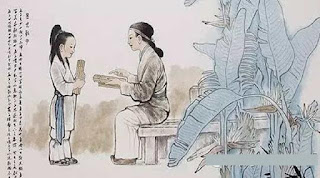Mencius was named Menke and his father menji. Mencius lost his father when he was young, and Mencius had never been a high-ranking official or got a good salary. What about Mengmu? Han Fei's biography contains the story of Mengmu's breaking and weaving. His work of bowing and weaving proves that he was not born as "Tao Zhugong". Orphans and widowed mothers, what is the property of Wanguan family?
Let's look at the three migrations of Mencius. It's not in Beijing or Shanghai. The Meng family moved from the cemetery to the market, and then to the school. They didn't leave zouyi in the state of Lu. They just moved around in that big "village".
What's more, moving at that time was not the same as today. People who read ancient books all know that at that time, there were only suitcases to hide clothes, only earthenware to store food, and most families did not even have tables, chairs and benches except pottery. It is estimated that when people leave, even if they move, it is really a very easy thing.
Let's talk about Qianjin. The gold here is not gold, but copper. The ancients divided gold into three grades. The first grade is gold, which is called gold; the second grade is silver; the last grade is copper, which is called red gold. In Mencius' time, the currency in Qilu, Yanzhao and other places was mostly knife coin made of copper. The "thousand" here is not a real number, but an exaggeration of the virtual meaning, which means that the mother of Mencius is just emphasizing that she will do whatever it takes to educate her children. Moreover, "Meng Mu San Qian" comes from Liu Xiang's biography of women. Liu Xiang was born in 77 BC and died in 6 BC. He experienced four emperors in his life. However, they were all in the early Western Han Dynasty, when the economy was in the recovery period. "Rice to stone is worth ten thousand yuan, and a horse is worth 100 yuan." maybe he measured the cost of Meng Mu's three migrations according to the economic situation in the early Han Dynasty.
To say the least, even if the "thousand" is a real number, there is still a problem of weight. In the past, a kilogram was only 228.86 grams, which is less than half a kilogram today. Even a kilogram is less than 500 today; If it is a thousand baht, it is said in Shuoyuan bianwu that "Sixteen millet is one bean and six beans are one baht". According to ancient records, twelve millet is one cent and twelve is one baht. According to this, the weight of 144 grains of millet is one baht, 24 baht is one or two, and 1000 baht is only 41.6 Liang, which is equivalent to 2.6 Jin in ancient times and 128 yuan in today's measurement. I think if it is the person who holds a kilogram of copper in his hand, I'm afraid nobody will be surprised at it

